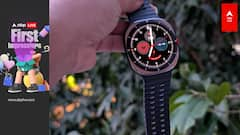Can Smartwatches Detect Higher Risk Of Heart Failure Or Arrhythmia. Know Everything
Smartwatches are capable of detecting a higher risk of heart failure and irregular heart rhythms, a new study published in the European Heart Journal -- Digital Health has said.

Smartwatches are capable of detecting higher risk of heart failure and irregular heart rhythms, a new study published in the European Heart Journal -- Digital Health has said. Smartwatches from the likes of Apple, Samsung and Fitbit are known to help keep track of heart health. Apple Watch checks for unusually high or low heart rates in the background, which could be signs of a serious underlying condition while Fitbit Sense 2 has an ECG app that can detect heart rhythm irregularities and automatically share them with your doctor.
Now, with the new study, researchers have claimed that they have identified ECG recordings containing extra heartbeats which are usually benign but, if they occur frequently, are linked to conditions such as heart failure and irregular heartbeats, which is also known as arrhythmia.
The European Heart Journal — Digital Health's peer-reviewed study took account of data from 83,000 people who had undergone a 15-second ECG comparable to the kind carried out using smartwatches and phone devices.
Heart failure happens where the heart pump is weakened while atrial fibrillation happens when abnormal electrical impulses suddenly start firing in the top chambers of the heart causing an irregular and often abnormally fast heart rate. It can be life-limiting, causing problems including dizziness, shortness of breath and tiredness and is linked to a five-fold increased risk in stroke. The ECG was done on people who were aged 50-70 and who had no known cardiovascular disease at the time.
The researchers found that people with an extra beat in this short recording (one in 25 of the total) had a two-fold risk of developing heart failure or an irregular heart rhythm over the next 10 years, says a report by news agency ANI.
"Our study suggests that ECGs from consumer-grade wearable devices may help with detecting and preventing future heart disease. The next step is to investigate how screening people using wearables might best work in practice," Lead author of the study, Dr Michele Orini (UCL Institute of Cardiovascular Science), said.
"Such screening could potentially be combined with the use of artificial intelligence and other computer tools to quickly identify the ECGs indicating higher risk, as we did in our study, leading to a more accurate assessment of risk in the population and helping to reduce the burden of these diseases."
Related Video
Apple creates a new record in iPhone sales after launch of iPhone 16 | ABP Paisa Live






































